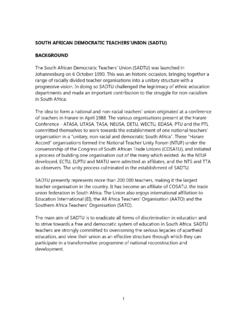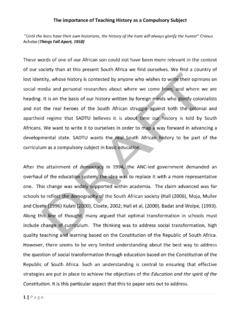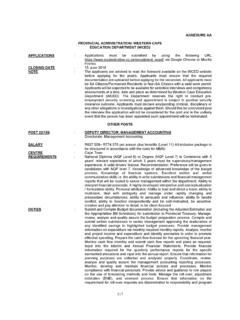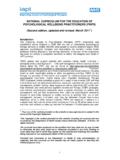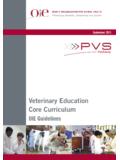Transcription of RESEARCH PROJECT By: Kaizer Mokone 30 April …
1 0 RESEARCH PROJECT By: Kaizer Mokone 30 April 2011 THE IMPACT OF ACADEMIC DEVELOPMENT PROGRAMMES ON THE PERFORMANCE OF LECTURERS IN THE CLASSROOM AT PUBLIC FURTHER EDUCATION AND TRAINING COLLEGES 1 CHAPTER 1 Conceptualization In education, academic development is an indispensable aspect of human resource management and development. In further education and training colleges (FETC), academic development programs should be implemented in order to help FET College lecturers to sustain high quality performance in their classroom teaching and encourage them to pursue life-long learning which is vital to their academic development.
2 Obviously, it is really impossible for academic development managers and/or skills development managers in public FET colleges to build a strategic plan for lecturer academic development without a fully understanding of its nature and factors related to lecturers career advancement. In South Africa, public FET Colleges lecturers have faced a barrage of policy changes in the 15 years since 1994. The FET Act of 1998, which set out broad and long-term national framework for transformation of curricula, learning and teaching, qualifications, funding, quality assurance and new institutional arrangements (DoE, 1998)
3 , the Further Education and Training Colleges Act, 2006 to support the vision of a modern, vibrant FET college system and the national Plan for Further Education and Training Colleges in South Africa in 2008, are amongst others policy changes that were implemented in public FET Colleges. All these policies and plans were intended to transform and build the public FET college sector to provide capacity for further education and training for unemployed youth and those who want to further their studies having completed the general education and training phase.
4 Based on these policy documents, the majority of lecturing staff needed to improve and update their academic and vocational knowledge and experience. However, despite the academic development programs, assessor course, NCV level 4 training, moderator training, mathematics workshops, business management course, ODETDP NQF level 5 course, facilitator training, etc as outlined in the FET 2010 Staff Training DataSet (Department of Higher Education and Training, 2011) that are being offered by public FET Colleges in South Africa, there is still a lack of capacity and weaknesses in academic development amongst these lecturers FET Steering Committee Report, 2010).
5 SADTU reported to the Commission on FET Colleges that no lecturer development is presently happening (Gauteng Provincial FET Summit, 2010). NEHAWU in their submission to Further Education and 2 Training Summit (September, 2010) argued that the educators have not been properly prepared for national curriculum (Vocation) programme and many of them are leaving the FET college sector as a result. Report of the Further Education and Training Steering Committee: Recommendation to the Minister of Higher Education and Training (October, 2010) identified staff development as weak and staff competence being variable at public FET colleges in South Africa.
6 Based on these discussion reports, the views of the FET Roundtable participants was that weak or lack of academic development programmes for public FET Colleges lecturers impact negative on teaching and learning which result in poor learner achievement. One of the goals of the national Skills Development Strategy 111 (2011, ) is to promote the growth of a public FET college system that is responsive to sector, local, regional and national skills needs and priorities. According to this (NSDS 111) government strategic guide for skills development, the public FET college system should be central to the government s programme of skilling and re-skilling the youth and adults.
7 NSDS 111 (2011) also states that there are many challenges in expanding and improving the capacity at FET colleges. As a result, one of the challenges of the SETAs in their Sector Skills Plans (SSP) is a need to build the capacity of public FET colleges to meet the goal of the NSDS111. According to the Sector Skills Plan (ETDPSETA, 2011, ) it is clear that lecturers were not adequately prepared for the introduction of the NCV curriculum and this has impacted both on their knowledge for the content of the curriculum and how to teach in the classroom.
8 There is a lower level of professional teaching qualifications of engineering lecturers in particular, which is illustrated in the 2009 Annual Survey data. This may account to some extent for the poor performance of learners on the NCV engineering programmes. According to Mbana (2009, ), teaching development for FET Colleges lecturers require a vigorous system of in-service training (in both content/ curriculum matters as well as methodology), but the situation is so dire that there is not even pre-service training for FET Colleges lecturers.
9 Therefore student performances on NCV programmes continue to be poor. This is evidenced by poor class attendance, high-dropout rate and low through-put rates. At the FET Roundtable (2010) one of the key challenges identified by participants was that at public FET colleges in South Africa, there is a lack of quality of teaching and learning which resulted in less 2 500 cohorts completing the NC(V) programme in 2009 out of the 320 679 who enrolled in 2007(Centre for Higher Education Transformation, 2009).
10 The national Information Service for Higher Education (2009, ) recommended that there should be an institutional partnership between universities and FET Colleges with specific reference to jointly offer certificate and 3 diploma programmes at NQF level 5 and 6 as per FET College plan (2008) to support sustainable capacity building programmes for teaching staff at FET Colleges. RESEARCH Statement Based from the conceptualization on academic development for public FET College lecturers, the impact of academic development programmes on classroom performance is one of the biggest problems facing public FET Colleges in South Africa based on the literature reviewed.


